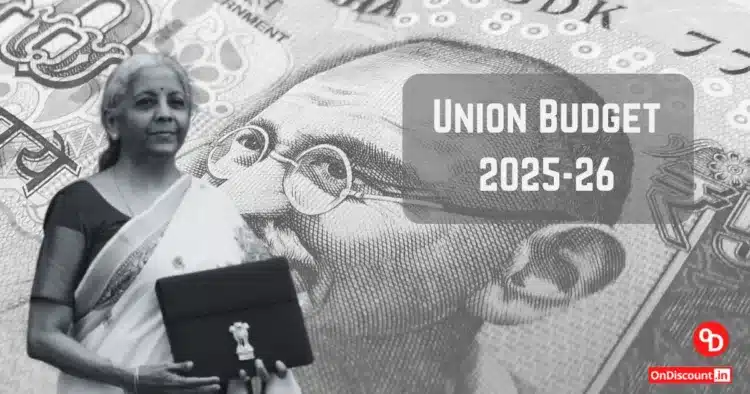Finance Minister Nirmala Sitharaman presented the Union Budget for the fiscal year 2025-26, introducing significant reforms aimed at boosting economic growth, supporting the middle class, and enhancing various sectors of the economy. This comprehensive overview provides key insights into the budget and its implications for Indian consumers.
Personal Income Tax Reforms
The most anticipated announcement in the union budget was the increase in the income tax exemption threshold under the new tax regime. The key changes include:
- No tax on income up to ₹12 lakh under the new tax regime, compared to ₹7 lakh previously.
- Rebate of ₹60,000, up from ₹25,000, ensuring that taxpayers earning up to ₹12 lakh pay zero tax after the rebate is applied.
- Additional standard deduction of ₹75,000 for salaried individuals, making incomes up to ₹12.75 lakh effectively tax-free.
New Tax Regime: Income Tax Slabs for FY 2025-26
- ₹0 – ₹4,00,000: No Tax
- ₹4,00,001 – ₹8,00,000: 5%
- ₹8,00,001 – ₹12,00,000: 10%
- ₹12,00,001 – ₹16,00,000: 15%
- ₹16,00,001 – ₹20,00,000: 20%
- ₹20,00,001 – ₹24,00,000: 25%
- Above ₹24,00,000: 30%
Old Tax Regime: Income Tax Slabs for FY 2025-26
- ₹0 – ₹2,50,000: No Tax
- ₹2,50,001 – ₹5,00,000: 5%
- ₹5,00,001 – ₹10,00,000: 20%
- Above ₹10,00,000: 30%
The old tax regime remains relevant for those who can claim significant deductions such as HRA, NPS, and home loan interest. However, the new regime is now beneficial for most taxpayers due to the higher rebate and simplified structure.
Agriculture and Rural Development
With an allocation of ₹2.66 lakh crore, the union budget emphasizes agricultural productivity and sustainability. Key initiatives include:
- High-Yield Crop Program: A six-year initiative to boost the production of pulses and cotton, reducing import dependency.
- Natural Farming Project: Transitioning one crore farmers to natural farming over the next two years, reducing reliance on chemical fertilizers and pesticides.
These initiatives aim to enhance food security and promote sustainable agricultural practices.
Support for MSMEs and Startups
Recognizing the crucial role of Micro, Small, and Medium Enterprises (MSMEs) and startups, the government introduced:
- Credit Guarantee Scheme: Easing access to loans for MSMEs by reducing lender risks.
- Technology Support Package: Enhancing technological capabilities for improved competitiveness.
- Abolition of Angel Tax: Facilitating capital raising for early-stage startups.
These measures are expected to boost entrepreneurship, innovation, and job creation.
Infrastructure Development
The union budget has allocated ₹11.1 lakh crore for capital expenditure, a 16.9% increase over the previous year. Key focus areas include:
- Urban Development: ₹11 lakh crore allocated for infrastructure projects in 14 cities, focusing on public transport and urban amenities.
- Rental Housing Initiatives: Developing rental accommodations for industrial workers through Public-Private Partnerships (PPP).
These developments will improve urban connectivity and overall living standards.
Energy and Sustainability
The government reinforced its commitment to energy security and sustainability with:
- Investment in Renewable Energy: Expansion of solar, wind, and hydropower projects.
- Nuclear Energy Mission: Aiming for 100 GW of nuclear power by 2047.
These initiatives align with India’s goal of achieving a self-reliant and sustainable energy ecosystem.
Fiscal Management
The government aims to reduce the fiscal deficit to 4.4% of GDP in 2025-26 while borrowing ₹14.82 lakh crore to cover expenditures. This approach balances fiscal prudence with economic growth.
Impact on Indian Consumers
The Union Budget 2025-26 is expected to bring major benefits for Indian consumers:
- Increased Disposable Income: Revised tax slabs and rebates leave more money in taxpayers’ hands, boosting spending and savings.
- Job Creation: Support for MSMEs and startups will generate employment across multiple sectors.
- Better Infrastructure: Investments in urban development and housing will improve quality of life.
- Sustainable Agriculture: Promotion of natural farming will lead to healthier food options and environmental benefits.
The Union Budget 2025 introduces transformative reforms across taxation, agriculture, MSMEs, infrastructure, and energy. With a strong focus on growth, sustainability, and fiscal responsibility, the budget is set to have a far-reaching impact on consumers and businesses alike. However, the success of these measures will depend on effective implementation and active participation from stakeholders in the economy.


